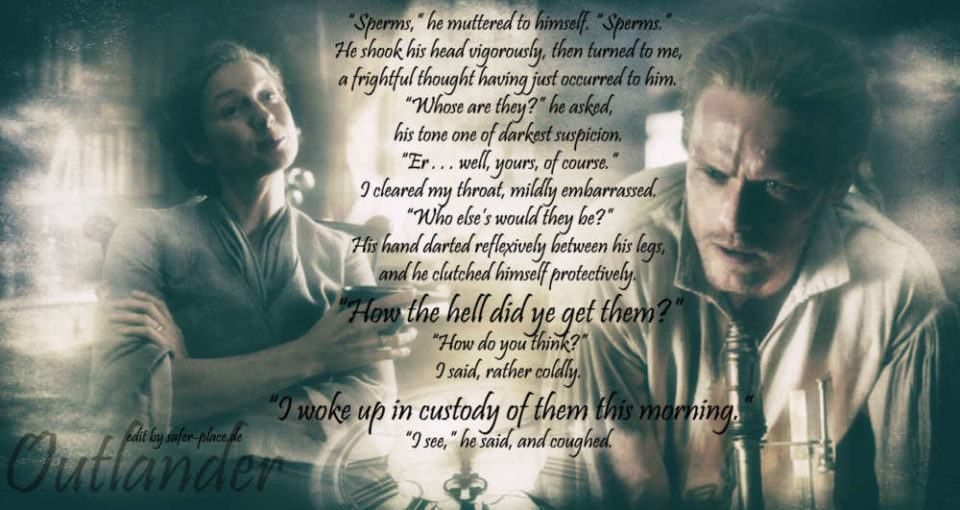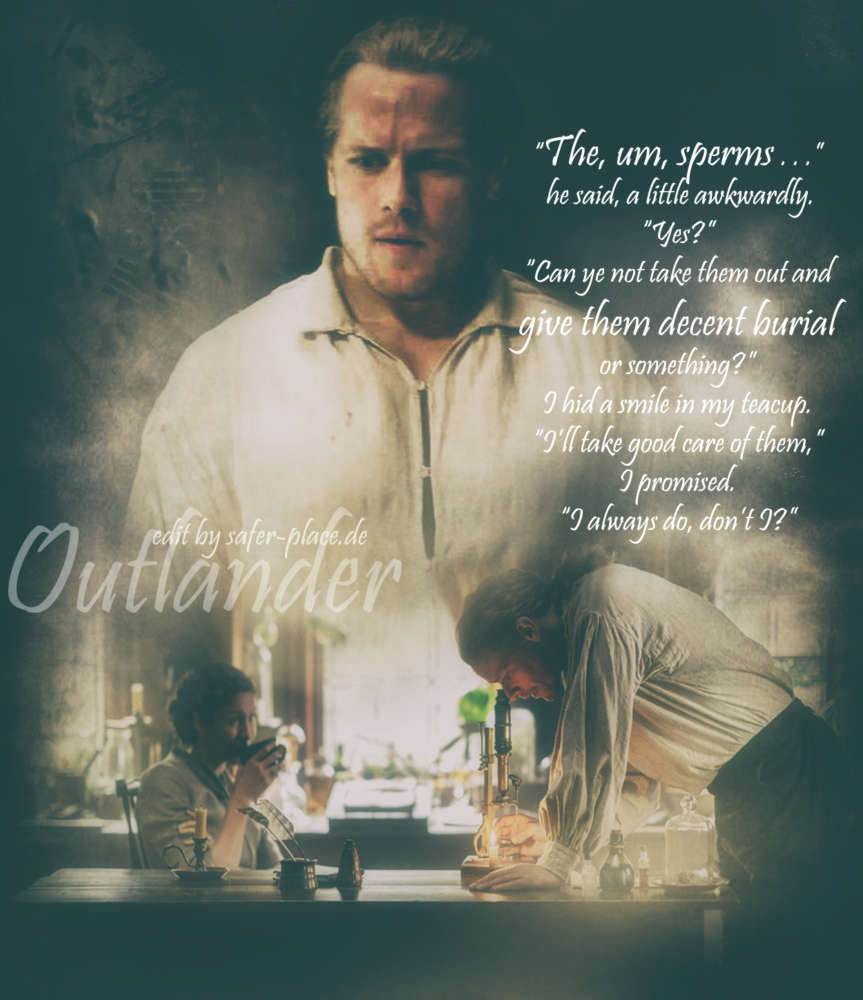the whole Passage from the Fiery Cross
“What are ye doing, Sassenach?” Jamie, with a piece of toast in one hand, paused in the doorway.
“Seeing things,” I said, adjusting the focus.
“Oh, aye? What sorts of things?” He came into the room, smiling. “Not ghosties, I trust. I will have had enough o’ those.”
“Come look,” I said, stepping back from the microscope. Mildly puzzled, he bent and peered through the eyepiece, screwing up his other eye in concentration.
He squinted for a moment, then gave an exclamation of pleased surprise.
“I see them! Wee things with tails, swimming all about!” He straightened up, smiling at me with a look of delight, then bent at once to look again.
I felt a warm glow of pride in my new toy.
“Isn’t it marvelous?”
“Aye, marvelous,” he said, absorbed. “Look at them. Such busy wee strivers as they are, all pushing and writhing against one another—and such a mass of them!”
He watched for a few moments more, exclaiming under his breath, then straightened up, shaking his head in amazement.
“I’ve never seen such a thing, Sassenach. Ye’d told me about the germs, aye, but I never in life imagined them so! I thought they might have wee teeth, and they don’t—but I never kent they would have such handsome, lashing wee tails, or swim about in such numbers.”
“Well, some microorganisms do,” I said, moving to peer into the eyepiece again myself. “These particular little beasts aren’t germs, though—they’re sperms.”
“They’re what?”
He looked quite blank.
“Sperms,” I said patiently. “Male reproductive cells. You know, what makes babies?”
I thought he might just possibly choke. His mouth opened, and a very pretty shade of rose suffused his countenance.
“Ye mean seed?” he croaked. “Spunk?”
“Well … yes.” Watching him narrowly, I poured steaming tea into a clean beaker and handed it to him as a restorative. He ignored it, though, his eyes fixed on the microscope as though something might spring out of the eyepiece at any moment and go writhing across the floor at our feet.
“Sperms,” he muttered to himself. “Sperms.” He shook his head vigorously, then turned to me, a frightful thought having just occurred to him.
“Whose are they?” he asked, his tone one of darkest suspicion.
“Er … well, yours, of course.” I cleared my throat, mildly embarrassed. “Who else’s would they be?”
His hand darted reflexively between his legs, and he clutched himself protectively.
“How the hell did ye get them?”
“How do you think?” I said, rather coldly. “I woke up in custody of them this morning.”
His hand relaxed, but a deep blush of mortification stained his cheeks dark crimson. He picked up the beaker of tea and drained it at a gulp, temperature notwithstanding.
“I see,” he said, and coughed.
There was a moment of deep silence.

“I … um … didna ken they could stay alive,” he said at last. “Errrrm … outside, I mean.”
“Well, if you leave them in a splotch on the sheet to dry out, they don’t,” I said, matter-of-factly. “Keep them from drying out, though”—I gestured at the small, covered beaker, with its small puddle of whitish fluid—“and they’ll do for a few hours. In their proper habitat, though, they can live for up to a week after … er … release.”
“Proper habitat,” he repeated, looking pensive. He darted a quick glance at me. “Ye do mean—”
“I do,” I said, with some asperity.
“Mmphm.” At this point, he recalled the piece of toast he still held, and took a bite, chewing meditatively.
“Do folk know about this? Now, I mean?”
“Know what? What sperm look like? Almost certainly. Microscopes have been around for well over a hundred years, and the first thing anyone with a working microscope does is to look at everything within reach. Given that the inventor of the microscope was a man, I should certainly think that … Don’t you?”He gave me a look, and took another bite of toast, chewing in a marked manner.
“I shouldna quite like to refer to it as ‘within reach,’ Sassenach,” he said, through a mouthful of crumbs, and swallowed. “But I do take your meaning.”
As though compelled by some irresistible force, he drifted toward the microscope, bending to peer into it once more.
“They seem verra fierce,” he ventured, after a few moments’ inspection.
“Well, they do need to be,” I said, suppressing a smile at his faintly abashed air of pride in his gametes’ prowess. “It’s a long slog, after all, and a terrific fight at the end of it. Only one gets the honor, you know.”
He looked up, blank-faced. It dawned on me that he didn’t know. He’d studied languages, mathematics, and Greek and Latin philosophy in Paris, not medicine. And even if natural scientists of the time were aware of sperm as separate entities, rather than a homogenous substance, it occurred to me that they probably didn’t have any idea what sperm actually did.
“Wherever did you think babies came from?” I demanded, after a certain amount of enlightenment regarding eggs, sperms, zygotes, and the like, which left Jamie distinctly squiggle-eyed. He gave me a rather cold look.
“And me a farmer all my life? I ken precisely where they come from,” he informed me. “I just didna ken that … er … that all of this daffery was going on. I thought … well, I thought a man plants his seed into a woman’s belly, and it … well … grows.” He waved vaguely in the direction of my stomach. “You know—like … seed. Neeps, corn, melons, and the like. I didna ken they swim about like tadpoles.”
“I see.” I rubbed a finger beneath my nose, trying not to laugh. “Hence the agricultural designation of women as being either fertile or barren!”
“Mmphm.” Dismissing this with a wave of his hand, he frowned thoughtfully at the teeming slide. “A week, ye said. So it’s possible that the wee lad really is the Thrush’s get?”
Early in the day as it was, it took half a second or so for me to make the leap from theory to practical application.
“Oh—Jemmy, you mean? Yes, it’s quite possible that he’s Roger’s child.” Roger and Bonnet had lain with Brianna within two days of each other. “I told you—and Bree—so.”
He nodded, looking abstracted, then remembered the toast and pushed the rest of it into his mouth. Chewing, he bent for another look through the eyepiece.
“Are they different, then? One man’s from another, I mean?”
“Er … not to look at, no.” I picked up my cup of tea and had a sip, enjoying the delicate flavor. “They are different, of course—they carry the characteristics a man passes to his offspring.…” That was about as far as I thought it prudent to go; he was sufficiently staggered by my description of fertilization; an explanation of genes and chromosomes might be rather excessive at the moment. “But you can’t see the differences, even with a microscope.”
He grunted at that, swallowed the mouthful of toast, and straightened up.
“Why are ye looking, then?”
“Just curiosity.” I gestured at the collection of bottles and beakers on the countertop. “I wanted to see how fine the resolution of the microscope was, what sorts of things I might be able to see.”
“Oh, aye? And what then? What’s the purpose of it, I mean?”
“Well, to help me diagnose things. If I can take a sample of a person’s stool, for instance, and see that he has internal parasites, then I’d know better what medicine to give him.”
Jamie looked as though he would have preferred not to hear about such things right after breakfast, but nodded. He drained his beaker and set it down on the counter.
“Aye, that’s sensible. I’ll leave ye to get on with it, then.”
He bent and kissed me briefly, then headed for the door. Just short of it, though, he turned back.
“The, um, sperms …” he said, a little awkwardly.
“Yes?”
“Can ye not take them out and give them decent burial or something?”
I hid a smile in my teacup.
“I’ll take good care of them,” I promised. “I always do, don’t I?”

All rights for the Picture from Outlander go to the rightful owner Starz/Sony
Quote and Excerpt by Diana Gabaldon from “The Fiery Cross”
I own nothing but the editing
Be First to Comment